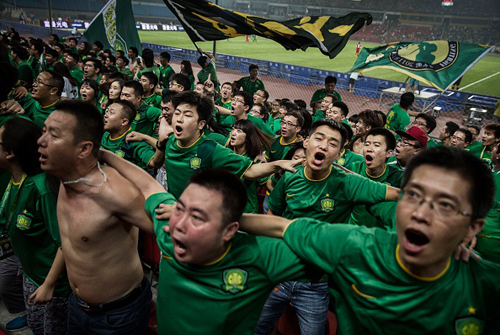Ultra supporters and fans of the Beijing Guoan FC celebrate together after a
goal during their Chinese Super League match on June 28, 2015 in
Beijing, China. There are growing legions of ardent supporters and
fans of China’s football clubs. The government is also trying to foster
a football culture in the country.
Chinese companies are buying soccer teams across Europe, echoing the Beijing government’s ambitious plan to turn the nation into a soccer powerhouse.
The powerhouse plan, which has backing from President Xi Jinping, has led to nine deals inked by Chinese investors for stakes in soccer clubs in France, Italy, Britain, and other European countries since January 2015.
The latest deal was clinched June 17 when the co-founders of the Chinese budget hotel chain 7 Days Group Holdings, Chien Lee and Zheng Nanyan, along with U.S. businessman Paul Conway of Pacific Media Group, jointly bought 80 percent of the French Ligue 1 soccer club OGC Nice for an undisclosed amount.
As a result, Lee and Zheng now each hold a 32 percent stake in the 112-year-old French club. And Lee has been appointed chairman of OGC Nice’s board of supervisors.
In a June 17 interview with Caixin in Hong Kong, Lee cited “strategic and financial” goals as reasons for the investment.
Also in June, Chinese home appliance retailer Suning Commerce Group bought an estimated 70 percent stake in Italy’s iconic club Inter Milan for 270 million euros (U.S.$297 million). That deal followed the takeover of English soccer club Aston Villa for about 97 million euros (U.S.$107 million) by Beijing-based food additives giant Recon Group in May.
According to Chinese state media reports, another six Chinese companies have poured money into European soccer clubs since last year. These include property developer Wanda Group, toymaker Rastar Group and the state-backed investment company China Media Capital Holdings (CMC).
In the largest investment to date, CMC in December 2015 partnered with state-run investment firm CITIC Capital Holdings while paying 354 million euros (U.S.$390 million) for 13 percent of Abu Dhabi-based City Football Group. City owns the Manchester City Football club, a top-ranked English Premier League team.
An international investment bank source who declined to be named said many European soccer teams have been approached by potential Chinese buyers.
Peter Schloss, Chief Executive at CastleHill Partners, a Beijing-based sports and media agency, said Chinese firms are benefiting from soccer investments in “political and business aspects,” as Chinese leaders have signaled strong interest in sporting industry development.
Chinese companies can benefit from government policies if they invest in the domestic soccer and sports sector, Schloss said, while those who invest overseas are showcasing their support for Beijing policy.
The State Council, China’s cabinet, in 2014 issued sports industry reform and development guidelines that raised the curtain for the current wave of investment. In March 2015, the central government issued a document outlining soccer industry reforms and called for making China a soccer powerhouse by 2050. A similar edict was issued in April.
Xi’s personal interest in soccer is also seen as an impetus for Chinese investments. During a visit to Britain last October, the president toured the City Soccer Academy linked to the Manchester City Soccer Club.
Xi told media before the trip that China plans to build 20,000 soccer schools within the next five years. He also called for closer cooperation between China and Britain in soccer training.
No wonder Lee cited “huge opportunities,” adding that he was attracted to OGC Nice by the team’s ability to train young players. These young players eventually can be introduced to soccer fields in China, where they can help promote an emerging industry for youth soccer coaching, he said.
Schloss sees business opportunities in areas such as game organizing, player agencies, and soccer education. “Soccer clubs are good investment targets, especially when they are combined with the Chinese market,” he said.
The Chinese government expects the domestic sports industry’s market value to hit 5 trillion yuan (U.S.$751 billion) by 2025, and the soccer industry value alone to top 2 trillion yuan (U.S.$301 billion), according to state council’s 2014 reform plan.
Currently, according to the consultancy PricewaterhouseCoopers, revenues from all China sports game tickets, merchandise, and advertising totaled U.S.$3.4 billion in 2015, compared to U.S.$63.6 billion in the United States.
Many Chinese investors are counting on the soccer market to help reach their future business goals.
“With yuan depreciation pressure, Chinese companies have rising demands for overseas assets,” said a source close to one soccer team investor. “It’s easier to get (government) approval for sports industry investment overseas due to the sector’s state support.”
Lee said his company is now looking for hotel assets to buy in Nice. The idea is to develop service packages that combine tourism, accommodations, and soccer games.
Suning Chairman Zhang Jindong said after his company’s recent investment he expects the sporting industry to become a new growth engine for the Chinese economy.
Suning is thus building a business “ecosystem” that links games, media, and e-commerce businesses, Zhang said.
ChinaFile
Please
contact us in case of Copyright Infringement of the photo sourced from the internet, we will remove it within 24 hours.

